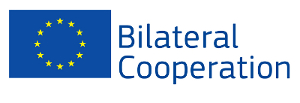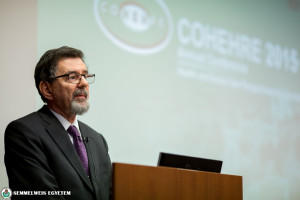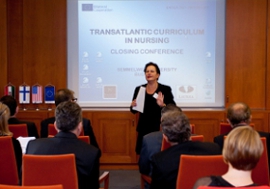 “It was in 2007 that Semmelweis University’s Faculty of Health Sciences (ETK) and its partners had applied for EU funding for the realisation of an international collaboration unique around the world,” Dr. Judit Mészáros, dean of the Faculty of Health Sciences recalled at the programme’s closing conference held last Friday. “Our main goal was to develop a cooperation that would allow a successfully completed Bachelor of Nursing degree to be recognised in both the European Union and the United States. In this way, the most talented students can earn a dual diploma over the course of their four-year studies,” Dr. Judit Mészáros said.
“It was in 2007 that Semmelweis University’s Faculty of Health Sciences (ETK) and its partners had applied for EU funding for the realisation of an international collaboration unique around the world,” Dr. Judit Mészáros, dean of the Faculty of Health Sciences recalled at the programme’s closing conference held last Friday. “Our main goal was to develop a cooperation that would allow a successfully completed Bachelor of Nursing degree to be recognised in both the European Union and the United States. In this way, the most talented students can earn a dual diploma over the course of their four-year studies,” Dr. Judit Mészáros said.
The TCN Atlantis project was created by a consortium comprised of three institutions: Nazareth College of Rochester (New York, United States), Laurea University of Applied Sciences (Tikkurila, Finland), and Semmelweis University. “Cooperation between our institutions, however, goes back to before the start of this programme; this is a long-standing relationship,” Dean Mészáros noted.
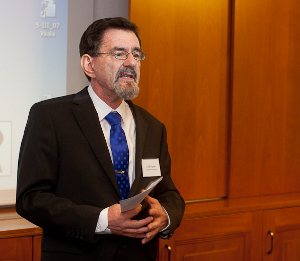 Dr. Ágoston Szél, rector of Semmelweis University, greeted the conference participants, remarking that the word university originates from the latin “universitas”, which means an ensemble of masters and disciples, a community of teachers and students. “Indeed, a long time ago, the university was a tight-knit community of its professors and students; today, however, a university cannot stand alone. The future belongs to collaboration and to sharing knowledge, ideas and know-how with each other,” Rector Szél asserted, adding that the notion of a dual diploma was virtually unknown a few decades ago, whereas today it is fashionable and modern. “Semmelweis University cannot respond to the challenges of our age in any other way than by creating more and more relationships,” he said.
Dr. Ágoston Szél, rector of Semmelweis University, greeted the conference participants, remarking that the word university originates from the latin “universitas”, which means an ensemble of masters and disciples, a community of teachers and students. “Indeed, a long time ago, the university was a tight-knit community of its professors and students; today, however, a university cannot stand alone. The future belongs to collaboration and to sharing knowledge, ideas and know-how with each other,” Rector Szél asserted, adding that the notion of a dual diploma was virtually unknown a few decades ago, whereas today it is fashionable and modern. “Semmelweis University cannot respond to the challenges of our age in any other way than by creating more and more relationships,” he said.
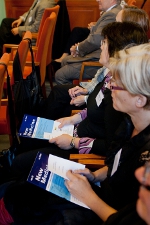 The TCN Atlantis (Transatlantic Curriculum in Nursing) programme was launched in 2007. The amount of interest on the part of the students was much greater than the number of available places. In the end, fifteen Hungarian students got to participate in the programme, out of whom ten have already earned their diplomas. The curriculum and exchange programme developed by the three participating institutions is such, that those who successfully complete its requirements receive a dual European and American diploma. The students had the opportunity to spend two semesters in the United States and one in Finland. American diplomas were granted to those who also completed the HESI exam, which is compulsory for all American nursing students.
The TCN Atlantis (Transatlantic Curriculum in Nursing) programme was launched in 2007. The amount of interest on the part of the students was much greater than the number of available places. In the end, fifteen Hungarian students got to participate in the programme, out of whom ten have already earned their diplomas. The curriculum and exchange programme developed by the three participating institutions is such, that those who successfully complete its requirements receive a dual European and American diploma. The students had the opportunity to spend two semesters in the United States and one in Finland. American diplomas were granted to those who also completed the HESI exam, which is compulsory for all American nursing students.
At the closing conference, the programme’s participants, coordinators and newly graduated students shared their experiences.
The project was supported by the European EACEA (Education, Audiovisual and Culture Executive Agency) and the American FIPSE (Fund for the Improvement of Postsecondary Education).
Pálma Dobozi
Translated by Gina Varga-Gönczi
Photo credits: Balázs D. Kiss
